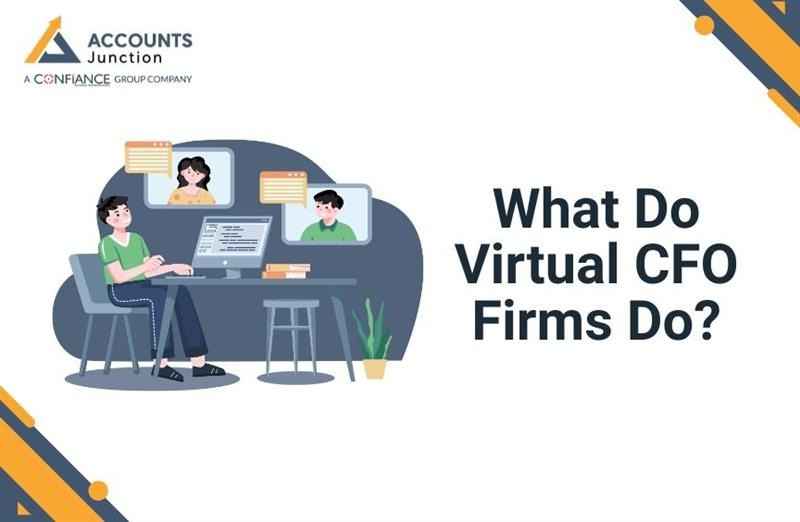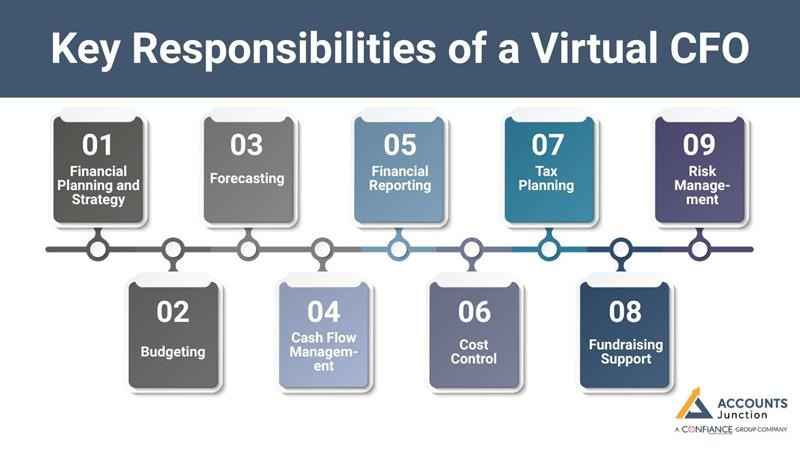
What Does Virtual CFO Do?
Every business needs strong money guidance to grow and do well, and Virtual CFO firms provide this expertise efficiently. Virtual CFO firms give this help in a way that is both simple and low-cost. Many small and mid-size firms choose these services instead of hiring a full-time Chief Financial Officer. These firms work online and give expert help to manage your money. They also use smart tools to track, plan, and improve your business cash flow and results.
What Is a Virtual CFO?
A Virtual CFO is a skilled money expert who works online. They help with budgets, planning, forecasting, tax tips, and business growth. Virtual CFO firms do the same work as a full-time CFO but on a part-time or contract basis. This makes them great for startups and growing businesses that need expert help at a lower cost.
Virtual CFO firms give you one expert or a full team. They use smart tools to track results, make reports, and keep your business on the right financial path.
Key Responsibilities of a Virtual CFO
1. Financial Planning and Strategy
- Virtual CFOs help create short and long-term financial plans. They analyze your current financial status and set realistic goals. These goals guide your business toward steady growth. Their financial guidance helps avoid mistakes and improve performance.
2. Budgeting
- They prepare clear budgets to control costs and manage resources. Budgets help track how much is spent and earned. Reviewing your budget often helps avoid waste.
3. Forecasting
- Using smart tools, Virtual CFOs predict sales, costs, and gains. This helps business owners make smart choices based on future trends. It also helps prepare for market shifts.
4. Cash Flow Management
- They track all the money coming in and going out. A strong cash flow lets the business pay its bills and keep running without trouble. It is key to long-term success.
5. Financial Reporting
- Virtual CFOs prepare reports each month, quarter, and year. These reports show how the business is doing with money. They help inside the firm and when speaking with banks or investors.
6. Cost Control
- Virtual CFO firms find costs that can be cut and suggest ways to save. This raises profit and cuts waste. Their help leads to better use of company funds.
7. Tax Planning
- Virtual CFO firms ensure that businesses stay compliant with all tax laws. They help reduce tax liabilities through proper planning. They also ensure that tax filings are done on time.
8. Fundraising Support
- If a business needs loans or investments, a Virtual CFO helps in preparing business plans, financial models, and presentations. They also guide during meetings with banks or investors.
9. Risk Management
- They identify possible financial risks and create plans to manage them. Risk management ensures that the business can face unexpected problems without heavy losses.
Benefits of Hiring a Virtual CFO
- Cost-Effective: You pay only for the services you need.
- Expert Financial Guidance: They bring years of experience from different industries.
- Flexible Services: Available on a part-time or contract basis.
- Use of CFO Software: Accurate financial tracking and reporting.
- Strategic Advice: Helps in long-term planning and decision-making.
Role of CFO Software
CFO software is a key part of Virtual CFO services. It makes financial tracking and reporting simple and fast. Here are the main features of CFO software:
- Real-time tracking of income and expenses
- Automated financial reports
- Budget creation and management tools
- Cash flow forecasting
- Integration with accounting systems
- Data security and easy access
Virtual CFO firms rely on this software to give accurate and timely insights. This helps business owners stay informed and make smart financial decisions.

When to Hire a Virtual CFO
Think about hiring a Virtual CFO if your business faces any of these situations:
Business Growth:
If your business is growing fast and you need financial guidance, a Virtual CFO can help. They provide advice to keep your growth steady and avoid costly mistakes.
Cost-Effective Option:
A full-time CFO can be expensive. A Virtual CFO offers the same expertise, but at a lower cost. You can hire them on a part-time or short-term basis.
Help with Budgeting:
If creating or managing budgets feels tough, a Virtual CFO can step in. They use CFO software to keep budgets on track and ensure you are spending wisely.
Improved Financial Reporting:
A Virtual CFO can help with understanding your financial reports. They break down the numbers so you can make better choices for your business.
Support with Fundraising:
If you are raising funds from investors or banks, a Virtual CFO can guide you. They prepare financial plans and help you present them clearly.
Tax Planning and Compliance:
Tax rules can be hard to follow. A Virtual CFO makes sure your business follows the rules and also finds ways to reduce your tax burden.
Better Decisions:
With a Virtual CFO on your team, you’ll make better choices. Their advice helps you avoid mistakes and improve your business’s financial health.
Virtual CFO firms provide financial guidance using the latest CFO software. They help you plan, save, and make smart decisions for the future.
Virtual CFO vs. In-House CFO
|
Feature |
Virtual CFO |
In-House CFO |
|
Cost |
Lower |
Higher |
|
Work Type |
Part-time or contract |
Full-time |
|
Location |
Remote |
On-site |
|
Tools Used |
Cloud-based CFO software |
Internal systems |
|
Best For |
Startups and small businesses |
Medium to large businesses |
Virtual CFOs offer the same level of expertise at a lower cost. They are ideal for companies that need flexible financial help.
How Virtual CFOs May Improve Business Decision Making
Making financial decisions can feel tricky and risky. A Virtual CFO can provide insights that make choices clearer and easier to understand.
- Identify Spending Patterns: They analyze income and expenses to highlight trends.
- Investment Guidance: Suggest areas to invest in or reduce costs.
- Simplified Explanations: Present complex numbers in simple, easy-to-understand ways.
- Confidence in Decisions: Owners may feel more assured in their choices.
- Strategic Planning: Help weigh pros and cons before major financial moves.
- Noticeable Impact: Even small adjustments guided by a Virtual CFO can lead to real results.
Technology and Tools Virtual CFOs Use
Virtual CFOs no longer rely solely on spreadsheets. They use advanced tools to make financial management faster and more accurate.
- Cloud-Based Platforms: Track income, spending, and profits in real-time.
- Cash Flow Forecasting: Predict cash flow weeks in advance.
- Automated Reports: Generate financial reports without manual work.
- Banking Integration: Connect directly with banking or accounting systems for up-to-date snapshots.
- Dashboards and Alerts: Use visual dashboards, alerts, and reminders for smoother financial tracking.
- Trend Analysis: Spot patterns and opportunities that may otherwise be missed.
Common Misconceptions About Virtual CFOs
Many business owners misunderstand what Virtual CFOs do. Clearing these misconceptions can help businesses make informed decisions.
Common Myths:
- Only for Big Companies: Virtual CFOs are equally valuable for small businesses.
- Expensive to Hire: Many offer flexible, affordable pricing models.
- Only Provide Reports: They also advise on strategy, growth, and risk management.
- Replace Human Interaction: Remote work does not mean less communication; updates can be regular, clear, and personal.
Understanding these points may encourage business owners to consider Virtual CFO services without hesitation.
A Virtual CFO offers expert financial services that help businesses grow. They provide strategic planning, budgeting, cash flow management, and risk control. Advanced CFO software offers accurate and timely data. Many virtual CFO firms offer flexible plans for businesses of all sizes. With proper financial guidance, business owners can make informed decisions and grow. Whether you run a startup or an established business, a Virtual CFO can help you plan for a stronger financial future. At Accounts Junction, we provide tailored Virtual CFO services to meet your business needs.
FAQs
1. What are Virtual CFO services and how do they work?
- Virtual CFO services provide expert financial management remotely. They handle planning, reporting, cash flow, and strategy using cloud tools, giving businesses the guidance of a full-time CFO at a lower cost.
2. How can a Virtual CFO improve cash flow management for my business?
- A Virtual CFO monitors income and expenses, forecasts cash needs, and recommends actions to prevent shortages. This ensures smooth operations and better money management.
3. Can small businesses afford outsourced CFO services?
- Yes, Virtual CFOs often work part-time or on contract, making professional financial guidance affordable without hiring a full-time CFO.
4. What is the difference between a Virtual CFO and a traditional CFO?
- Virtual CFOs work remotely and focus on strategy, reporting, and planning. Traditional CFOs are full-time, in-house, and handle daily financial operations.
5. How do Virtual CFOs support budgeting and financial planning?
- They create, review, and track budgets, compare forecasts to actual results, and suggest cost-saving measures to meet financial goals.
6. Can a Virtual CFO help a startup secure funding or investment?
- Yes, they prepare financial models, projections, and presentations to attract investors or secure bank loans.
7. What financial reports does a Virtual CFO provide for small businesses?
- Virtual CFOs deliver cash flow statements, profit & loss reports, balance sheets, and customized dashboards for strategic insights.
8. How do Virtual CFOs reduce financial risks for growing companies?
- They identify risks like overspending, poor cash flow, or debt issues, then provide strategies to mitigate potential problems.
9. Which accounting and financial software do Virtual CFOs use?
- They use cloud tools like QuickBooks, Xero, Zoho Books, or specialized CFO software to automate reporting and track performance.
10. Can Virtual CFO services help in cost reduction and profitability?
- Yes, they analyze expenses, suggest efficiencies, and guide investment decisions to increase profits without affecting operations.
11. How often should a Virtual CFO provide financial updates or reports?
- Reports can be monthly, quarterly, or annually, based on business needs. Regular updates help owners make informed decisions.
12. Are Virtual CFOs suitable for medium-sized companies?
- Absolutely. Medium businesses can benefit from strategic planning, cash flow management, and risk reduction without hiring a full-time CFO.
13. Can a Virtual CFO help with tax planning and compliance?
- Yes, they ensure compliance, optimize tax strategies, and coordinate with accountants to minimize liabilities.
14. How do Virtual CFOs assist in strategic business growth?
- They recommend investments, expansion opportunities, and cost-effective strategies, using financial data to support growth decisions.
15. Can Virtual CFOs work with businesses in multiple industries?
- Yes, many Virtual CFOs have experience across sectors, offering insights and best practices from various industries.
16. How can a Virtual CFO improve decision-making for business owners?
- They provide clear financial analysis, scenario planning, and forecasts, helping owners make informed, confident decisions.
17. Is hiring a part-time Virtual CFO more cost-effective than a full-time CFO?
- Yes, businesses pay only for needed services, saving on salaries, benefits, and overhead costs of a full-time CFO.
18. How do Virtual CFOs create financial forecasts and budgets?
- They analyze past performance, track trends, and use software to predict revenue, expenses, and cash needs.
19. Can a Virtual CFO manage fundraising or investor reporting?
- Yes, they prepare financial reports, projections, and dashboards that meet investor or lender requirements.
20. Why should my company partner with a Virtual CFO service provider?
- Partnering provides expert financial guidance, strategic insights, and accurate reporting without full-time costs. Businesses gain confidence and clarity in decisions.
